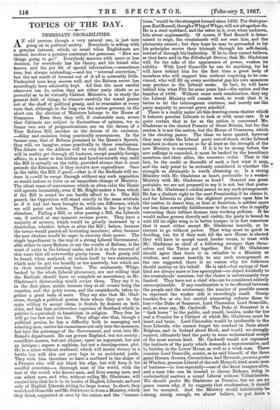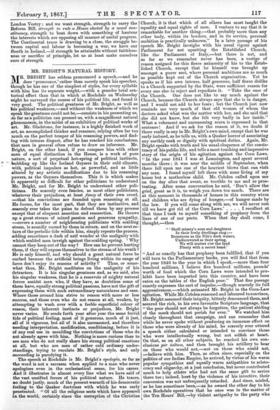TOPICS 'OF THE DAY.
IMMEDIATEPROBABILITIES.
AN oddprocess, though a very natural one, is just now going on in political society. Everybody is asking with a genuine interest, which, as usual when Englishmen are excited, involves a genuine contempt for grammar, " How are things going to go ?" Everybody answers with more or less decision, for everybody has his theory, and his friend who knows, and his pet bit of special information,—sometimes true, but always misleading,—and his " internal conviction," but the net result of forecast out of it all is miserably little. Undecided men keep secrets well, and the Reform secret has accordingly been admirably kept. All that the most careful observers can do, unless they are either party chiefs or so powerful as to be virtually Cabinet Ministers, is to study the general drift of things, to winnow carefully the sound grains out of the chaff of political gossip, and to remember at every turn that, although in the long run the nation governs, in the short run the election of Ministers belongs to the House of Commons. Even then they will, if reasonable men, aware that Cabinets are subject to fluctuations of opinion, try to frame two sets of prognostications, one on the datum of a Tory Reform Bill, another on the datum of its omission, —delay and omission being practically synonymous. In the former case, that of Reform promised in the Queen's Speech, they will, we imagine, come practically to these conclusions. The debate on the Address will be very dull, and the House will in reality get through all business, except possibly foreign affairs, in a more or less listless and hand-to-mouth way, until the Bill is actually on the table, provided always that it must precede the Estimates, if they involve new expenditure. Once on the table, the Bill, if good,—that is, if the Radicals will en- dure it,—will be swept through without any such opposition as would induce or force on an immediate change of Ministry. The silent sense of convenience which so often rules the House will operate irresistibly, even if Mr. Bright makes a fuss, which if the Bill is sound he can hardly afford to do. The Bill passed, the Opposition will stand exactly in the same attitude as if it had not been brought in, with one difference, which we will point out below. That attitude is the key to the situation. Failing a Bill, or after passing a Bill, the Liberals can, if united, at any moment resume power. They have a majority of seventy, which would be greatly increased by a dissolution, whether before or after the Bill ; before, because the towns would punish all hesitating members; after, because the new electors would be eager to exercise their power. The single impediment in the way of a strong Liberal Government, able either to carry Reform or use the results of Reform, is the want of unity in the Liberal ranks, and it is on the removal of this want that all noteworthy gossip turns. Such gossip will be found, when analyzed, to reduce itself to two statements, which may be put too broadly or too narrowly, but which are in their essential .meaning true. The aristocratic Whigs, backed by the whole Liberal plutocracy, are not willing that the Radicals should have so complete an ascendancy as Mr. Gladstone's dictatorship would secure them. They say it is, in the first place, unfair, because they at all events bring the counties, and the petty towns, and the cousinhoods, taken to- gether a great body of seats. They say also that Mr. Glad- stone, though a political genius from whom they are in the main willing to accept ideas, is Scotch by descent on both sides, and has that perfervidum ingenium of Scotland which in politics is equivalent to fanaticism in religion. They fear he will go too fast and too far. They allege also that, though a political genius, he has a difficulty both in managing and selecting men, carries his earnestness not only into the measures, but into the patronage of the Government, and even into Mr. Brand's department. He can govern England, but not society ; conciliate masses, but not cliques; upset an argument, but not an intrigue ; expose a sophism, but not a drawing-room plot. He is a sabre without scabbard, which will secure victory in a battle, but will also cut your legs in an accidental jostle. They wish him therefore to have a scabbard in the shape of a Premier who will not blunt his edge, but will keep it for needful occasions—a thorough man of the world, with the tact of the world, who knows men, and lives among men, and can select men, and who, without ruling Mr. Gladstone, will remind him that he is to be leader of English Liberals, and not only of English Liberals sitting for large towns. In short, they wantLord Granville andMr. Gladstone to form a Ministzy, which they think, supported at once by the nation and the "connec- tions," would be the strongest formed since 1832. For their. pur. pose EarlRussell, though a Whig of Whigs, will not altogether do. He is a steel scabbard, and the sabre in it, even when undrawn, hits about unpleasantly. Of course, if Earl Russell is deter- mined to reign, the cousinhoods will not oust him, and the plutocrats cannot ; but they hope he may be persuaded to let his principles secure their triumph through his self-denial, instead of through his leadership. If he is, they cannot believe, as they have said in the Edinburgh Review, that Mr. Gladstone will, for the sake of the appearance of power, weaken its solidity. With Lord Granville he can do anything, for he will have behind him for the first time a great body of members who will support him without requiring to be con- vinced, who will fill up every accidental gap his own measures. may produce in the Liberal ranks. In fact, he will have behind him what Pitt for some years had—the nation and the families of 1688. Without some such combination, they say the Liberal Ministry will remain weak, so weak that it is better to let the interregnum continue, and merely use the party majority to prevent grave mischief.
There is a reality under all this drawing-room chatter which it behoves genuine Liberals to look at with some care. It is quite certain that as far as the nation is concerned Mr. Gladstone is the elected Premier of Great Britain, but for the session it is not the nation, but the House of Commons, which is the electing power. The ideas we have quoted, however they may strike the Liberal party ont-of-doors, strike Liberal members in-doors as true, so far at least as the strength of the new Ministry is concerned. If it is to be strong before the new suffrage is conceded, it must be backed by the hereditary members and their allies, the nouveaux riches. That is the fact, be the credit or discredit of such a fact what it may,.
and the only point to be seriously considered is whether the strength so obtainable is worth obtaining so. Is a strong Ministry with Mr. Gladstone as heart, preferable to a weaker Ministry with Mr. Gladstone as head ? Granted one great postulate, we are not prepared to say it is not, but that poste' late is Mr. Gladstone's cordial assent to any such arrangemenb. He has a distinct right to the next Premiership if he claims it, and for Liberals to place the slightest pressure upon him in the matter, to desert him, or hint at desertion, is neither more nor less than cowardly faithlessness to the man who is rapidly converting their loftiest dreams into working policies. If he would rather govern directly and visibly, the party is bound to wait till its right wing is in better temper, is in fact conscious that it must either accept Mr. Gladstone heartily, or be content to go without power. That wing must be quick in deciding, too, for if they wait till the new House is elected they will have to accept much harder terms, to treat with Mr. Gladstone as chief of a following stronger than them- selves and the Tories put together. But if Mr. Gladstone should agree that force is as valuable to a Ministry as wisdom, and assent heartily to any such arrangement as the one suggested, there is no reason why his followers should mutiny on his behalf. He is said—but sayings of that kind are always more or less apocryphal—to object decidedly to the cousinhoods' nominee, but the choice is unfortunately very limited. They have not a chief who can be considered entirely unexceptionable. If any combination is to be effected between the people and the aristocracy, the number of possible names to represent the weaker side is exceedingly small. Gossip touches five or six, but careful winnowing reduces them to four—the Duke of Somerset, Lord Clarendon, Lord Granville, and, as some say, Mr. Cardwell. The Duke of Somerset is a " dark horse " to the public, and would, besides, make far too real a Premier for a Cabinet of which Mr. Gladstone must be heart and brain. Lord Clarendon would be intolerable to the true Liberals, who cannot forget his conduct in Paris about Belgium, and in Ireland about Birch, and would, we strongly suspect, ultimately land the party in some ecclesiastical scrape of the most serious kind. Mr. Cardwell would not represent the instincts of the party which demands a representative, and is, besides, in the Lower House, as well as a weak man. There remains Lord Granville, cousin, as he said himself, of the three great Houses, Gowers, Cavendishes, and Howards, persona grata at Windsor, genuine Liberal of the soft Morpeth kind, acute man of business—in iron especially—one of the finest tempers alive,. and a man who can be trusted to choose Bishops, being in ecclesiastical matters a sound Liberal without Voltairianisna.. We should prefer Mr. Gladstone as Premier, but we see no grave reason why, if he suggests that combination, it should not be accepted. And the Ministry would indubitably be strong, strong enough, we almost- believe, to put down a
London Vestry ; and we want strength, strength to carry the Reform Bill, strength to rule a House elected by a novel con- stituency, strength to beat down with something of hauteur the interests which are opposing all manner of useful progress. The Continental truce is drawing to a close, the struggle be- tween capital and labour is becoming a war, we have our South in Ireland,—if strength be attainable without faithless- ness or sacrifice of principle, let us at least make ourselves sure of strength.



































 Previous page
Previous page